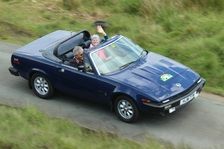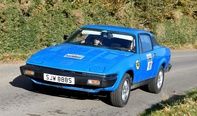Postby Hasbeen » 22 Oct 2020 03:13
I use Penrite 10/40 semi synthetic [old engine high zinc] with STP in the 7 & 8, both recently fully rebuilt engines. I use Penrite 5/40 fully synthetic with STP in the Mazda & Toyota shopping trolleys, & Penrite 5/30 fully synthetic with STP in the Honda S2000.
I never "run in" an engine today, as unlike the old days, there is nothing to run in. The days of hand scraped white metal bearings are long past.
I never run an engine without STP in it, & the following is why. It's a long story, so get a coffee if you are interested.
In 1962 I bought a new Morgan +4. After 4,000 miles I decided I was never going to learn to drive it properly on the public road, so did a full racing preparation of the mechanicals, with the plan to do a little hill climbing.
The Morgan distributor invited me to join their team to race at a meeting at Albury, so I started racing. 900 miles of road driving, & 65 miles of practice & racing on the new engine later, we pulled it engine apart to see how it was going. Horror, the big end slippers in the rod cap, [only the cap, not the rod], were down to copper. I was using the very best oil available back then, BP course racing oil.
Just in passing, the BP course came with a little glass jar of zinc liquid to add directly to the engine immediately it was started after an oil change.
We could neither see or measure anything wrong, so rebuilt the thing. Next meeting locally with about 80 miles racing, with the red line reduced from 6500 to 6000, & another strip produced the same result.
We went to Bathurst. 6250 RPM down Conrod, & a check after 40 miles of practice copper, & again after the race on the new slippers.
Rebuilt again, we added Molislip Molybdenum to the oil. We did first one meeting OK then copper again after 2 meetings.
At this time STP entered the Oz market, so we gave it a try. First one meeting then 2 then 3, & finally 4 meetings between checks, & still no copper. I don't know how long the STP could have preserved those bearings, because I sold the car & went racing in a Lotus F2.
After a year or so I bought an old Brabham F2 less engine. A mate & I built an engine using the serious bits from Cosworth & Holbay. It broke the lap record at a major circuit, then I won outright or it's class in combined F1 & F2 races in every race it started for the next 20 months I owned it.
I used to laugh quietly to my self at competitors trundling round closed circuits, "running in" their newly built racing engines. From my experience, with the fuels & oils of the 60s, they needed a decoke & valve grind by the time they decided the engines were run in. I considered my engine "run in" when the oil reached operating temperature. It never failed with that treatment.
We did lap new rings in to our polished bores with Brasso metal polish, & finish lapping the valves the same way, but that was for power, not bedding.
This is just my experience, so not gospel, I give it for what you think it is worth.
Hasbeen




